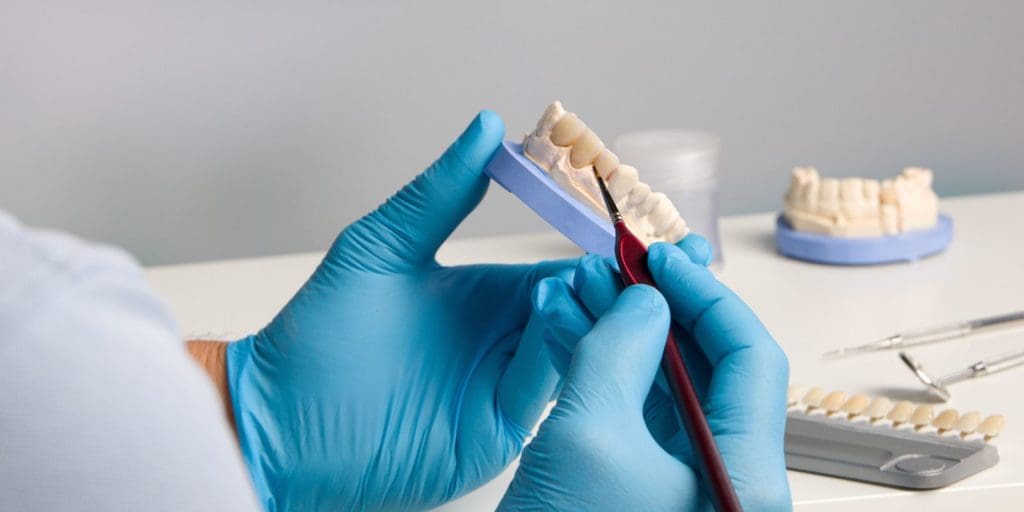When seeking dental restoration, many people get confused between crowns and veneers. They both cover the teeth in some way and almost look the same from the front. But fundamentally, they’re quite different from each other.
In case you’re getting crowns for teeth, the entire surface of each tooth will be covered by the restoration, while with veneers, only the front surface is covered. And while sometimes, you have the option to choose between the two, it’s not always possible.
Crowns vs Veneers: What Are The Differences?
There are more than structural differences between these two dental restorations, which are as follows:
Candidates
You’re better suited for a dental crown if your teeth are extensively damaged or decayed (but not to the point where tooth extraction is required). In this case, dental crowns can actually help protect them through their covering.
Here, you should also note that some people also get crowns for deep stains on their teeth. These are usually intrinsic and cannot be cleaned with a whitening procedure.
While veneers can be used for this, it’s possible that the underlying stains show through the veneers, which will ruin the overall aesthetic appearance of your teeth.
Veneers are the better option if you’re not happy with the shape, size or overall appearance of your teeth. It’s heavier on the cosmetic side, unlike a crown, which is usually preferred for functional restoration.
Tooth Shaving
A dental crown “caps” the entire tooth, and for this reason, it needs more space to fit onto the existing tooth. Because of that, if you’re getting a crown, more of your natural tooth will be shaved.
Keep in mind that a dental crown is about 2mm thick, so more than half of your underlying tooth has to be shaved. For this reason, this kind of dental restoration is more invasive.
Veneers, on the other hand, are about 0.5mm thick (a range of different veneer thicknesses are available though).
So, it doesn’t require extensive shaving of the underlying tooth. Still, keep in mind that you’re likely going to have your teeth shaved even with veneers because they’ll look too bulky and unnatural otherwise.
Recovery
Neither crowns nor veneers have a prolonged and extended recovery period. It may take some time for you to adjust to both of them.
However, as far as the post-op side effects are concerned, you may experience more sensitivity, irritation and pain after getting dental crowns. That’s because that procedure is more invasive.
Longevity
Because of its structure, a dental crown will last longer than a veneer. In general, you can expect them to stay intact for as long as 10-15 years, provided you have good oral hygiene.
On the contrary, veneers usually last for 5 years or so. You should know, however, that their longevity can vary depending on their material composition.
For instance, porcelain veneers are much stronger and last longer than say composite veneers. Porcelain could even last for as long as a decade if you take good care of your teeth.
Cost
While crowns and veneers are available on the NHS (Band 3 – £282.80), you won’t be able to get these treatments unless there’s a “clinical need” for them.
So, if you’re just looking to improve the appearance of your smile through these restorations, you’ll have to get these treatments privately.
The prices of both crowns and veneers are almost comparable. On average, you can get one (for one tooth) for £600-£1000. There are, of course, higher and lower prices than that, depending on the material that you go with (metal-fused crown, zirconia, porcelain gold, resin).
Also, the prices in the UK can vary depending on the location of the clinic and the experience of the surgeon. Still, overall, if you’re getting veneers or crowns for a number of teeth, the procedure can cost you quite a lot.
For this reason, many people choose to get their teeth done in another country – Turkey being a very popular destination for dental tourists. There, you can get a single crown/veneer for less than £200.
Which Is Better For You: Crowns or Veneers?
As mentioned above, it will come down to your needs. If your teeth are badly damaged, you’d be better off with a crown. However, if you want to make moderate changes to your smile, veneers will be the better choice.
Just keep in mind that in some cases, patients are unable to get veneers even if their problem is “moderate.”
That’s because of the existing structure of your teeth. For instance, if they’re aligned a certain way, it may not be possible to place the veneers. In that case, your dentist may recommend a crown instead.
Similarly, the location of the tooth also matters. Many people get veneers for front teeth and crowns for back teeth because of the differences in biting pressure.
Conclusion
Both crowns and veneers are effective dental restorations. However, they both serve slightly different purposes. And it’s important that you’re clear on those so that you know what you’re getting yourself into.

